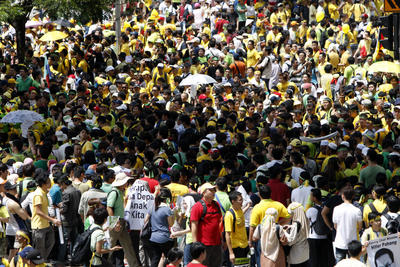PAS, which ranked third for the number of parliamentary seats won at the federal-level general election of March 2008, will be aiming to gain more parliamentary seats at the coming polls. Discussion at the general assembly was directed toward that goal.
That PAS would want to expand on its gains at the next general election is understandable, considering that the party — which was formed in 1951 — is the oldest opposition party in the country. In 2008, however, PAS joined the Pakatan Rakyat coalition, which also comprises the People’s Justice Party (PKR) and Democratic Action Party (DAP). The coalition is headed by Anwar Ibrahim, leader of the much smaller PKR, who is touted to be prime minister of any future Pakatan government.
An interesting development at the general assembly was the idea that PAS’ president, Abdul Hadi Awang, should instead be the preferred candidate for prime minister if the Pakatan Rakyat coalition were to defeat the ruling Barisan Nasional government. This was met by strong approval by delegates at the general assembly, and signalled a shift in PAS’ posturing within the opposition coalition.
Thus far, PAS has been willing to take the backseat in Pakatan’s campaign for power on the assumption that Anwar would be the most likely candidate for prime minister. This stance was developed on the grounds that he is best positioned to bridge the differences between the Malay-Muslim-dominated PAS and the Malaysian-Chinese-dominated DAP.
The prospect of an Islamist prime minister, in the form of Abdul Hadi Awang, is a possibility that has never been seriously contemplated until now (although a similar proposal was raised at the 2008 PAS general assembly). Just why PAS members were keen to propose their leader as the next prime minister is an interesting question, coming as it does so close to the general election.
Firstly, there is the question of whether PAS’ membership of the Pakatan Rakyat coalition has cost PAS some of its votes and support from its traditional Malay-Muslim vote bank. Over the past five years the coalition has had to address issues ranging from environmental politics to the welfare state, which have not traditionally been the party’s focus. Some PAS members feel the party has veered off its Islamist path by its engagement with other issues. This was reflected in criticism by PAS’ youth wing that the party’s newspaper, Harakah, ought to serve the interests of the party first and foremost rather than focusing on broader concerns.
Secondly, there is the question of simple arithmetic: if PAS was and remains the biggest party in the PAS-PKR-DAP coalition, then why should the leader come from one of the smaller parties? PAS members may feel that as the oldest and biggest party in the coalition they should have the right to lead Pakatan and any government formed in its name.
However, this is all contingent upon PAS winning its share of 40 parliamentary seats at the election. Some PAS leaders have confided that while party members may be enthusiastic about an Islamist prime minister, the rest of the country may not be as excited by the prospect. This view is supported by UMNO leaders like Saifuddin Abdullah, who noted that ‘PAS has so far campaigned on things like the welfare state, and the DAP keeps saying that Anwar is their choice for prime minister. To have a PAS leader as prime minister is another matter’.
Talk of PAS members trying to push for an Islamist prime minister has so far been divisive. The opposition coalition has tried to maintain its cohesion by campaigning on broad-based issues such as a minimum wage program and the welfare state, but many suspect that non-Malay support for the opposition will erode if there is a real prospect of the country coming under the leadership of an Islamist prime minister.
Beyond the shores of Malaysia, the country’s neighbours, which have never had to deal with the prospect of a Malaysia under the leadership of Islamists, may be prompted to ask whether Malaysia’s foreign or defence policies will change significantly. In the 2000s PAS leaders were mostly known for their fiery anti-Western rhetoric and their protests against American intervention in Afghanistan and Iraq. A decade on, the party seems to be closer to realising its domestic political goal, which may have implications for Malaysia’s regional standing and bilateral ties with other states. Much, therefore, depends on whether PAS manages to improve its parliamentary representation at the next general election, and whether it ends up being the party with the most parliamentary seats in the opposition coalition.
Dr Farish A Noor is Senior Fellow at the Contemporary Islam Programme, S. Rajaratnam School of International Studies, Nanyang Technological University.
A version of this article was first published here as RSIS Commentary No. 212/2012.

